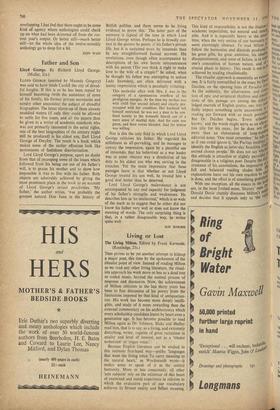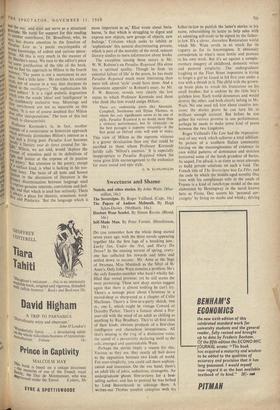Living or Lost
The Living Milton. Edited by Frank Kermode. (Routledge, 21s.) The Living Milton. Edited by Frank Kermode. (Routledge, 21s.) THIS proves to be yet another attempt to kidnap a major poet, this time by the spokesmen of the ritualist point of view. Instead of reading Milton as we read any other living literature, the ritual- ists approach his work more or less as a dead text or coded music, beyond the normal process of response and discussion. Now, the achievement of Milton criticism in the last thirty years has been to free discussion of his poetry from the limitations imposed by that kind of antiquarian- ism. His work has become more deeply intelli- gible, and study of it more rewarding than the external commentary on his architectonics which every scholarship candidate learnt by heart even a generation ago. It has become possible to read Milton again as Dr. Johnson, Blake and Shelley read him, that is to say, as a living, and extremely disturbing, writer, capable of great variations in quality and level of interest, not as a 'master
technician' or 'organ voice.' , Because English literature can be studied in this intimate first-hand way—unlike 'languages that want the living voice To carry meaning to the natural heart,' as Wordsworth wrote—it makes sense to speak of it as the central humanity. More or less consciously, all other 'arts subjects' rely on the existence of this heart of examined and tested experience in relation to which the evaluative part of our vocabulary achieves its firmest reality and fullest meaning.
SPECTATOR. NOVEMBER 11. 196 This kind of responsibility is not the illusion el academic imperialists, but natural and inesa,,t able. And it is especially heavy at the preg"' time, when the very notion of our humanity seem alarmingly abstract. To read Milton s11; follow the harmonies and discords produced' his great gifts, his great ambition, his idealisti; disappointments, and sense of failure, is to react one's conception of human nature, and nik, crucial phase in history. This result is not to achieved by reading ritualistically. The ritualist approach is essentially an extelti. one. It is fairly exemplified in the essay by 0,3 Daiches, on the opening lines of Paradise 1."' , As the sublimity, the allusiveness. and Ou; Lion of epic and scriptural rhythms and assi)elo. tions of this passage are among the ack?°0, ledged marvels of English poetry, one may 1,151 fiably expect something quite uncommon reading put forward with so much pretens0; But Dr. Daiches begins, 'Every schoolV; knows,' and the words might serve as an allerlt tive title for his essay, for he does not nr, more than an elaboration of long-standif/: editorial notes. 'One must remember,' he tel 00; as if one could ignore it, 'the Puritan tendencYcis identify the English as latter-day Israelites, 0 htt second chosen people.' He does not say wil.ele,l'of this attitude is attractive or slightly parochts, 0; disagreeable in a religious poet. Despite the l orateness of his annotations, the impression of full and balanced reading eludes hirn• at explanations leave out his own reaction to.soto. is done, and the effect is of something gratutOok With one exception, all the essays in the Om are, in the most limited sense, 'literary' ones'„,ic Donald Davie chattily discusses Milton's 01",o and decides that it appeals only to 'the v°' and the ear,' and does not serve as a structural Frinciple. He turns for support for this reading `a another contributor, Dr. Broadbent, who, he YS, has drawn attention to the function of paradise Los/ as 'a poetic encyclopaedia of reane knowledge, of ardent and curious specu- ljt")n. All this is very much in the manner of Daiches's essay. We turn to the editor's piece for some justification of the title of the book, and We find his approach to Milton in the fourth rnence, `Lhe poem is not a monument to any meas. And a little later: 'He enriches his central aril. not of course in a way that sharpens its ppeal calve to the intelligence.' He sophisticates his subject.' It is a rigid aesthetic dogmatism this uses the words 'ideas' and 'intelligence' in this. confidently exclusive way. Meanings and Celr enrichment are not as separable as this cjilAes. 'It is not of course doubted that Milton r:me$ offer interpretations.' The tone of this last `ark is characteristic. exProfessor Kermode's is, in fact, another which of a connoisseur or historicist approach man seriously diminishes Milton's interest as ca n and a living poet. Paradise Lost becomes 1,Y a literary tour de force created for 'de- t. Milton, we are told, would 'deplore the ti,,lintun$ of attention paid to its definitions of an'd' and justice at the expense of its passion Poetry.' But attention to the poetry, except blItti a surface kind, is what is lacking in his too- 04nt essay. The basis of all taste and honest D;iiiirila0,.0 in the .discussion of literature is the it, tY discrimination between language used in ',press genuine interests, convictions and feel
es, and that which is used less seriously. There
IWaYs a place for rhetoric, ornament, word- play and Pindarics. 'But the language which is more important to us,' Eliot wrote about Swin- burne, 'is that which is struggling to digest and express new objects, new groups of objects, new feelings.' Criticism which seeks to inhibit or `sophisticate' this natural discriminating process, which is part of the morality of the mind, reduces literary studies to mere information about books.
The exception among these essays is Mr. W. W. Robson's on Paradise Regained. His alone has a spiritual quality. Though he finds 'an essential failure of life' in the poem, he has made Paradise Regained much more interesting than mere talk about 'style' could have done. And a 'dissentient appendix' to Robson's essay, by Mr. F. W. Bateson, reveals very clearly the low status to which Professor Kermode and those who think like him would assign Milton:
There arc undeniable poets like Akenside.
Campbell, Swinburne and Dylan Thomas, in
whom the only significance seems to be one of style. Paradise Regained is no doubt more than
a virtuoso performance, but its virtuosity—in the best passages a supreme virtuosity—is the
first point an Oxford critic will wish to make. This view of Milton as the supreme virtuoso is a graver devaluation than any that could be ascribed to those whom Professor Kermode luridly calls 'Milton's enemies.' It is especially inappropriate to Paradise Regained where the verse gives little encouragement to the enthusiast for mere sound and epic style.
G. D. KLINGOPULOS















































 Previous page
Previous page